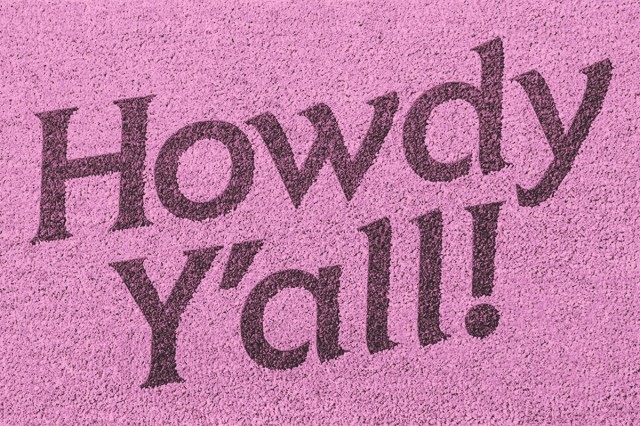
In the United States, “you guys” is one of the most commonly used second-person pronoun references, but “y’all” is all the rage. While “y’all” is still heard primarily in the Southern United States and nationwide in African American Vernacular English (AAVE), its usage has been on a dramatic rise since the late 20th century.
The increasing popularity of “y’all” can be attributed to a variety of factors, including the mainstream use of AAVE in media, as well as the fact that “y’all” is a preferable gender-neutral alternative to “you guys.” “Y’all” also rolls off the tongue in a softer, warmer way than “you guys” or even “you all.” For instance, “You guys come back tomorrow” sounds clunky and even vaguely threatening, while “Y’all come back tomorrow” may be perceived as both friendlier and more inviting.
The correct spelling places an apostrophe between the “y” and the “a,” as it’s a contraction of “you” and “all.” The pronoun got a nod from Dictionary.com in the summer of 2021 when it gave “y’all” its own entry, separate from “you-all.” The entry notes the word “now communicates an informal tone more than a regional identity, and one that has become popular among younger demographics for its inclusivity.”
As far as American Southernisms go, the second-person pronoun “y’all” is probably among the most familiar. The use of “y’all” in a movie or TV show is a quick signifier of a character’s place of origin. How and when this contraction for “you all” came to the Southern U.S. is a little murky, however. Once believed to be a fairly recent neologism native to Southern American English, “y’all” has actually been around quite a bit longer than lexicographers previously realized. The second edition of the Oxford English Dictionary dated the term to 1909, but in fact it was first used in the 1631 poem “The Faire Aethiopian” by English poet William Lisle:
The captiue men of strength I gaue to you,
The weaker sold; and this y’all know is true,
The free-borne women ransom’d, or set free
For pittie sake, the seruile sort had yee.
Thanks to digitized databases, we now know “y’all” existed outside of the United States prior to its first appearance there in the early 19th century. Its usage in the Southern United States has been linked to Scots-Irish immigrants and their use of the second-person plural pronoun “ye aw.” Other linguists believe “y’all” is rooted in early African American vernaculars or African English Creole. It’s likely a combination, as both Scots-Irish immigrants and enslaved African Americans were living and interacting in the same regions at the same time. In any case, there’s no doubt that “y’all” has since become the most identifiable feature of the Southern American English dialect.
There was a time when early Standard English had both a singular and plural set of second-person pronouns. “Thou” and “thee” were singular, while “ye” and, maybe confusingly, “you” were plural. Over time, however, “ye” and “you” began serving as formal singular pronouns when speaking to someone of high prestige or importance, such as the clergy or aristocracy. As people shifted between “ye” and “you” and “thou” and “thee” based on whom they were speaking to, “you” and “ye” eventually merged into just “you,” while “thou” and “thee” vanished from conversation entirely.
“You” can still be used as a singular or plural pronoun, but other terms have slipped into various regional dialects, including “you guys,” “you lot,” “you ones,” “you’uns,” “yinz,” “yous,” “youse,” “you all,” and “y’all.” In England, “you lot” is the American version of “you guys.” The Scottish say “you ones,” which found its way into Appalachia as “you’uns.” Travel north of Appalachia into Pittsburgh and western Pennsylvania, and you’re likely to hear a shorter version of “you’uns” in “yinz.” In New York City, you might hear “yous” (also spelled “youse”) or “youse guys.”
Interestingly, none of these second-person pronouns — including “y’all” — is considered Standard English. Why? Linguists point to the stigmatization of the people who tend to use these pronouns: people from the South, people of color, and people from poor rural and poor urban areas.
There’s some debate about whether “y’all” can be used as a singular second-person pronoun (to refer to a single person, rather than a group), but linguists have already documented “y’all” being used that way. So, if “y’all” can refer to a single person OR a group of people, is there a need to pluralize it further? Some people say yes — and “all y’all” is the answer. So, while “y’all” may refer to an indeterminate number of people, “all y’all” refers to everyone who is being addressed.















